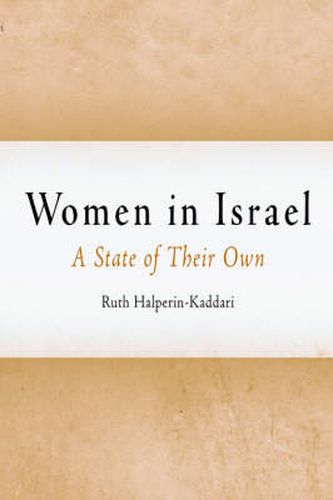Readings Newsletter
Become a Readings Member to make your shopping experience even easier.
Sign in or sign up for free!
You’re not far away from qualifying for FREE standard shipping within Australia
You’ve qualified for FREE standard shipping within Australia
The cart is loading…






When Israel declared its independence in 1948, it vowed to ensure equality for all citizens, regardless of religion, race, or gender. History shows, however, that this promise has been broken in the case of women, who generally live under circumstances significantly worse than those of men. Women in Israel is the first comprehensive overview of discrimination in a state dominated by a patriarchal religious order, and brings fresh insights to the efficacy of the law in improving the status of women. Providing a sociolegal perspective on women in Israel viewed, Ruth Halperin-Kaddari examines all aspects of Israeli women’s lives, looking at legal issues such as affirmative action, motherhood and the workplace, and mechanisms for the advancement of women, as well as conditions of education, employment, health, family, and prostitution.
While tracing legislative evolution in Israel, Halperin-Kaddari discusses the extent to which law can create social change. Because of its unique position as an economically developed democracy and yet a state where government tries to maintain a special cultural tradition and religious identity in a heterogeneous society, Israel has failed to adopt a single national standard for women that would bring Israeli law into compliance with international human rights. Halperin-Kaddari concludes that the improvement in women’s status has not been due to egalitarian consciousness, but rather is incidental to Israel’s overall socioeconomic advancement.
$9.00 standard shipping within Australia
FREE standard shipping within Australia for orders over $100.00
Express & International shipping calculated at checkout
When Israel declared its independence in 1948, it vowed to ensure equality for all citizens, regardless of religion, race, or gender. History shows, however, that this promise has been broken in the case of women, who generally live under circumstances significantly worse than those of men. Women in Israel is the first comprehensive overview of discrimination in a state dominated by a patriarchal religious order, and brings fresh insights to the efficacy of the law in improving the status of women. Providing a sociolegal perspective on women in Israel viewed, Ruth Halperin-Kaddari examines all aspects of Israeli women’s lives, looking at legal issues such as affirmative action, motherhood and the workplace, and mechanisms for the advancement of women, as well as conditions of education, employment, health, family, and prostitution.
While tracing legislative evolution in Israel, Halperin-Kaddari discusses the extent to which law can create social change. Because of its unique position as an economically developed democracy and yet a state where government tries to maintain a special cultural tradition and religious identity in a heterogeneous society, Israel has failed to adopt a single national standard for women that would bring Israeli law into compliance with international human rights. Halperin-Kaddari concludes that the improvement in women’s status has not been due to egalitarian consciousness, but rather is incidental to Israel’s overall socioeconomic advancement.